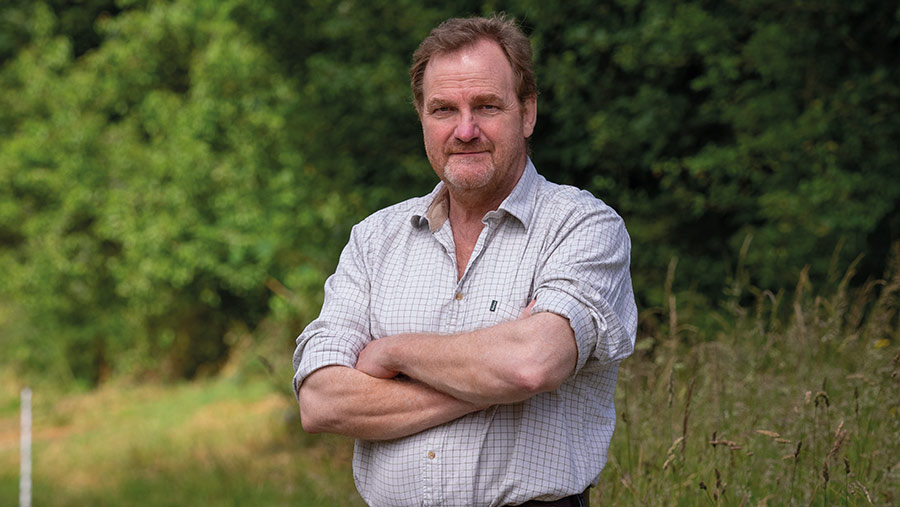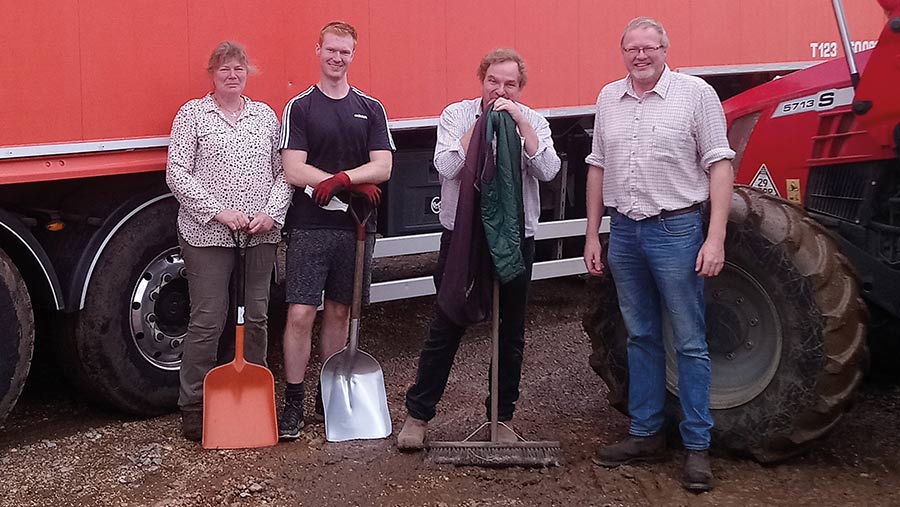Flindt on Friday: A wild new era begins at Manor Farm
 © Kathy Horniblow
© Kathy Horniblow Two very significant things happened last autumn. First, our youngest set off for his placement year in the City, and within a matter of days, it became blindingly obvious that he had found his vocation.
Obvious – but no surprise – he’s returning to the Flindt roots.
He’s working a few yards away from his Uncle Ian, a couple of buildings away from where his great-grandfather spent his working life, and not far from where Gustavus Flindt set up as a foreign exchange broker after arriving on these shores from Germany at the very end of the 18th century.
Jonathan was simply following his brother and sister away from the farm.
See also: How a Family Charter can help farm succession plans
It’s sad in many ways, not least because the two boys are the most instinctive tractor drivers I’ve ever come across, and Diana is the only person to come close to having Hazel’s supernatural affinity with livestock.
All three of them should really be putting wellies on every morning. But that’s it and all about it – as Jonathan’s grandfather would often say when debate is done.

Team Ginger: Hazel, Anthony (home for harvest), Charlie and brother-in-law Noel load the last lorry © Charlie Flindt
Hazel and I had a bit of a moment when the truth dawned on us: we have no third generation to take on our tenancy.
I’m 60, she’s 21 (again), and time is creeping on. Bits of me (some of them mentionable, some of them not) don’t work anymore, and another 10 or 15 years aren’t going to improve things.
The farm is in dire need of infrastructure overhaul, and the money involved (all from our own pockets, of course) would need far longer than a decade to pay itself off.
(Re)wild idea
Then the second thing happened. There was a phone call from the landlord. They said they’d like to come and see us. Curious, we thought. “Come on round,” we said, “we’ll put the kettle on.”
Out came the tea and Hobnobs, and the Trust got straight to the point. “We’re on a mission to plant 20m trees and commit 25,000ha to assorted ‘nature recovery’ projects. And we’re looking for farmers to help us out.”
“Hmmm,” I said, trying not to sound too enthusiastic.
“Nice idea, but where would we live? We’re tenants with no savings and nothing to sell to raise funds. I’m content to stop arable farming after 38 years, but Hazel can’t live without her cattle and sheep.”
The next few weeks were a frenzied blur of negotiations, suggestions and countersuggestions – all of which are highly confidential, of course.
I think I’m allowed to say, however, that both sides emerged content with the outcome.
The sacred AHA is intact, although the farm itself will shrink to about 100 acres come Michaelmas. Hazel is now the third “generation”, and we’re secure in the house where I was born.
We are keeping barns and 15 acres of permanent pasture, and the arable land we’re retaining will be grassed over for assorted environmental schemes. And I can sell the sprayer.
Nature, nature, nature
Meanwhile, the Trust can press ahead with its very public promises, most of which involve overuse of the word “nature”.
What exactly will they do? Who knows? It’s their land, and they can do what they want. We will watch with interest.
It would be mischievous of us to add to the rumour mill that’s outraging the neighbouring White Settlers by suggesting wind farms, solar panels and car parks, so we’re making do with “free-range beaver” and “organic wildebeest”.
“Really?” ask some White Settlers, whose smart accents cover up remarkable rural ignorance.
Meanwhile, spare a thought for the Trust’s agents (and there’s a phrase I never thought I’d write) who are being summoned to explain themselves to local parish councils, and being harangued by frightfully important people who have lots of money, demanding land for their llamas. (And there’s Hampshire in one sentence.)
Autumn years
So what of the future? I haven’t given it much thought, concentrating instead of getting our last-ever harvest in. There’s already a big hole in the mental calendar we all live with where the multitude of autumn jobs should be.
I’m going to be sowing grass seed for the first time ever, so there’s a whole new set of challenges – as well as some shopping for kit.
The rest of the now-superfluous machinery will be examined, valued, and put on the market to top up the pension fund.
Hazel is already filling her diary with more bookkeeping and dog-training jobs, which will fit nicely around her livestock plans.
Meanwhile, there are indications that selling my tractor might be a bit premature; the Trust are looking for someone to help look after the land I’m giving up.
I’m hopeful of popping up in these pages now and then, although Flindt on Friday will cease in a few weeks; I can’t do a “grumpy farmer in his cab, battling the elements” column if I am no longer doing any of that.
Come October I will have a third book to polish up. Rather spookily, I started it last Michaelmas, thinking it would be just another mundane diary.
I hadn’t expected that phone call from the Trust. (I do need to clear some room in the west wing for it, though, so if you haven’t got your copies of books one and two, look lively; Christmas is coming.)
Eco untrendy
Don’t go thinking (and I have had to make this clear to my wonderful landlord, which was keen to suggest otherwise in press releases) that I have had some Damascene conversion to eco-farming, and now worship at the shrine of St Greta.
Far from it. I think all forms of reducing food production – including tree planting, rewilding, organic and regenerative – are lunacy.
What we’re doing is borne of pragmatism, not green dogma.
We’ll have a front-row seat as land into which I have (literally) shed blood, sweat and tears enters a new phase in its centuries-old agricultural journey, and I will watch (and, I hope, report) with great interest.
My little package of 1,800 annual tonnes of stuff will be off the market. The more farmers who are in the lucky position to do what we’re doing, the sooner the cry will go out for a return to food production.
Don’t laugh; consider how public opinion on rewilding has changed in a few short months – as the Trust is finding out on its social meeja pages.
Who knows – farming’s golden days may be on the way back. Too late for Anthony, Diana and Jonathan, of course. But that’s it and all about it.
